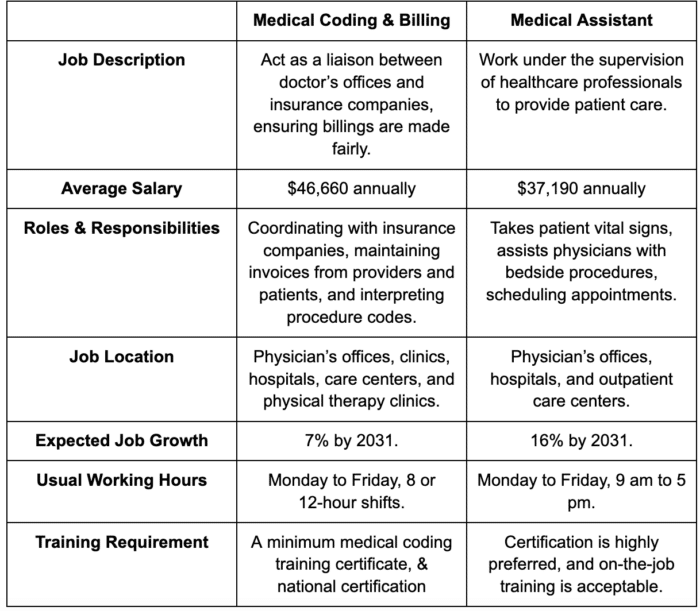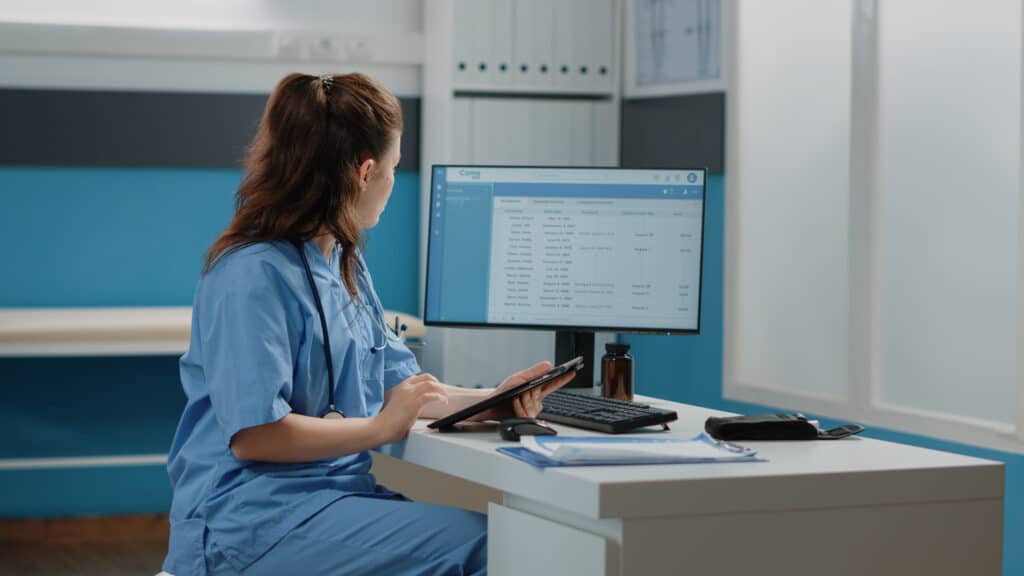If you want to enter the healthcare industry without the hassle of attending years of schooling, you might be considering a career in either medical assistance or medical coding/billing.
A medical assistant is a healthcare worker that assists physicians, nurses, and other healthcare professionals as and when required. Their duties include clinical and administrative tasks, which can range from assisting with bedside procedures to scheduling appointments.
Find out more about their scope of practice by state here.
What is a medical coding and billing specialist?
Medical coding and billing specialists are healthcare workers that manage the billings and coding in different healthcare settings to ensure prompt payments and reimbursements made by patients and providers respectively.
Read on to find everything you will need to know about the similarities, differences, educational requirements, salaries, and much more.
Also see: 12 Reasons to Become a Medical Assistant
Medical Assistant vs Medical Coding & Billing: An Overview
Medical assistants and medical billing specialists are both healthcare professions, but they have important distinctions and similarities.
Firstly, medical assistants have a broader scope of duties compared to medical billing specialists. While medical assistants are involved in clinical tasks like measuring vital signs and assisting in patient care, medical billing specialists focus solely on billing and administrative work related to healthcare services.
Their main responsibility is to ensure accurate billing and manage patient financial information.
On the other hand, medical coders, who are a type of medical billing specialist, require a more comprehensive understanding of current procedural terminology, international classifications of diseases, and healthcare common procedure coding systems.
Their role involves assigning specific codes to procedures and diagnoses for accurate billing and record-keeping purposes.
Let us take a look at a quick overview of medical assistant vs medical coding and billing:-
Medical Assistant: An Overview
Medical assistants, also known as medical assistant technicians, have a diverse range of responsibilities that involve both administrative tasks and assisting with patient care.
Here are some key medical assistant job duties:
1. Administrative Tasks:
– Scheduling appointments: Medical assistants manage appointment schedules for patients, ensuring efficient coordination between healthcare providers and individuals seeking medical care.
– Managing medical records: They maintain and update patient records, including medical history, test results, and treatment plans. This ensures accurate documentation and easy access to information during patient visits.
– Billing and coding: Medical assistants may assist in medical billing processes by preparing invoices, verifying insurance coverage, and coding procedures for accurate billing purposes.
– Handling correspondence: They handle phone calls, emails, and other forms of communication, providing information to patients, scheduling follow-ups, and responding to inquiries.
2. Clinical Tasks:
– Vital signs and measurements: Medical assistants take and record vital signs such as blood pressure, temperature, pulse rate, and weight, providing essential information to healthcare providers.
– Preparing patients for examinations: They help patients get ready for medical procedures or examinations by explaining the process, answering questions, and ensuring their comfort.
– Collecting specimens: Medical assistants may collect specimens like blood, urine, or other samples, following proper protocols for laboratory testing.
Also see: Can Medical Assistants Draw Blood?
– Assisting during medical procedures: They provide support to healthcare professionals during procedures, such as handling instruments, sterilizing equipment, and maintaining a sterile environment.
– Patient education: Medical assistants offer guidance to patients regarding medications, post-care instructions, and general healthcare information.
Here is more on: CMAA vs CCMA
It’s important to note that the specific responsibilities of medical assistants can vary depending on the healthcare setting, specialty, and state regulations. However, their role combines administrative tasks with hands-on patient care to support the efficient functioning of healthcare facilities.
How to Become a Medical Assistant?
To become a medical assistant, having a high school diploma or GED is typically the minimum educational requirement. However, many employers prefer candidates who have obtained certification as a medical assistant before starting their job.
Also see: Which medical assistant certification is best
Certification can be obtained through medical assistant program offered by colleges or specialized online certificate programs. The duration of these programs can range from 4 months to 2 years, and they can be completed either online or in person.
Medical assistants commonly find employment in healthcare clinics or doctors’ offices. They also have the opportunity to specialize in specific areas such as pediatrics, cardiology, or podiatry, allowing them to work in specialized clinics related to those fields.
See also: Types of Medical Assistants
Typically, medical assistants follow regular business hours; however, in some cases, urgent care clinics may require them to work nights, weekends, or even holidays.
Medical assistants are often on their feet for most of the day, actively engaging with patients and physicians. They work in a fast-paced environment and have the potential for highly rewarding careers.
Medical Coding & Billing: An Overview
The role of a medical coding and billing specialist primarily involves working with computers and requires proficiency in billing codes and communication with insurance companies.
Here are some key responsibilities of medical billing and coding specialists:
– Accurate coding
– Maintaining coding standards
– Insurance verification
– Billing and invoicing
– Follow-up on claims
– Patient billing inquiries
– Medical record management
It’s important to note that the specific responsibilities of medical coding and billing specialists may vary depending on the healthcare setting, such as hospitals, clinics, or medical billing companies.
They play a crucial role in ensuring accurate billing, timely reimbursement, and efficient financial management within the healthcare system.
Medical records specialists typically have regular business hours, which means they work during typical workday hours. They are employed in various healthcare settings, including doctors’ offices, dentists’ offices, physical therapy clinics, and any other facilities that can receive reimbursement from insurance companies.
Medical coders, as compared to medical assistants, spend extended periods sitting and working at a computer. Their role requires a high level of attention to detail because many procedures may appear similar but need to be billed differently based on coding guidelines.
Key Similarities Between Medical Coding/Billing and Medical Assisting
Despite their differences, medical assistants and medical coders do share some important similarities.
Let us take a look at some of the key similarities between these two professions:
1. Healthcare Knowledge: Both medical assistants and medical coders require a solid understanding of basic medical care. They need to be familiar with common procedures, tests, and medical assistant terminology relevant to their respective roles.
2. Diligence: Attention to detail and diligence are essential qualities for all healthcare professionals. Both medical assistants and medical coders must be meticulous in their work to avoid errors that could have significant consequences for patients. Ensuring accurate documentation and maintaining data integrity are critical aspects of their roles.
3. Administrative Duties: Although the nature of their administrative tasks may differ, both medical assistants and medical coders often spend a significant amount of time working with computers and engaging in phone-based communication. Medical administrative assistants, in particular, may have a more pronounced focus on administrative responsibilities compared to clinical tasks.
4. Patient Advocacy: Both medical assistants and medical billing specialists share a common commitment to patient care. They are entrusted with the responsibility of advocating for patients and ensuring their well-being.
Key Differences Between Medical Coding/Billing and Medical Assisting
Medical assistants and medical records specialists, despite having similarities, also have different daily responsibilities, such as:
1. Pay: Medical coders tend to have higher average salaries compared to medical assistants. Medical coders earn an average of $46,660 per year, while medical assistants earn an average of $37,190 annually. The difference in pay is around $10,000 per year, on average.
2. Training: The educational requirements for medical assistants and medical coders differ. Medical assistants can enter the field with just a high school diploma or GED, although obtaining certification is often preferred by employers.
On the other hand, medical coders typically require a certificate, and many employers prefer candidates with an associate’s degree. The additional education and training for medical coders contribute to their specialized knowledge in coding and billing practices.
See: Medical Assistant Degree vs Certificate
3. Daily Tasks: While both medical assistants and medical coders may spend time working on computers and using telephones, the nature of their daily tasks varies. Medical assistants are often engaged in a broader range of responsibilities, which may include clinical tasks like taking vital signs, assisting with examinations, and providing direct patient care. They may also perform administrative duties and assist with various manual labor tasks.
In contrast, medical coders primarily focus on coding and billing processes, working with medical records and insurance documentation. They spend more time working with coding systems, assigning appropriate codes to procedures and diagnoses, ensuring accuracy, and verifying compliance with coding guidelines.
Medical Coding/Billing vs Medical Assisting: Salary Comparison
Both medical assistants and medical records specialists can earn decent salaries. The average annual salary for medical assistants, according to the U.S. Bureau of Labor Statistics, is approximately $37,190, equivalent to an hourly rate of $17.88. On the other hand, medical records specialists earn an average annual salary of around $46,660, which amounts to an hourly rate of $22.43.
It’s important to note that these figures represent average salaries and can vary depending on factors such as experience, location, and specific employer.
See also: How to get Medical Assistant jobs with no experience
For medical assistants, the most highly paid professionals can earn up to $65,000 per year. This can be achieved through acquiring additional certifications, gaining substantial experience, or working in specialized fields that offer higher salaries.
Similarly, medical coders who hold advanced degrees and possess specialized expertise can earn over $100,000 per year. The advanced degree provides them with a competitive edge and opportunities for higher-paying positions within the field.
See more on: Certified Medical Assistant Salary
Medical Assisting vs Medical Billing/Coding: Job Outlook
Healthcare professions generally offer positive job outlooks. Medical assistants are expected to experience a growth rate of 16% by 2030, while medical coding and billing specialists can anticipate a growth rate of 7%. These figures have been pulled from the U.S. Bureau of Labor Statistics.
Medical assistants seeking career advancement often pursue further education to become nurses or physician assistants. Alternatively, they can become office managers or instructors for medical assistants.
Medical coders can progress from coding in smaller offices to auditing large hospitals or taking on managerial or directorial roles in coding.
See more on: Medical Assistant Job Outlook
Skills Required for Medical Assistants vs Medical Coders/Billers
When deciding between a career as a medical assistant or a medical coding and billing specialist, it’s essential to assess your strengths, weaknesses, and personal preferences to determine which profession aligns better with your personality.
Some skills required apart from the general medical assistant skills include:
- Good dexterity
- Comfortable with bodily fluids
- Organizational skills
- Compassion
- Great customer service skills
- Endurance
While medical coders may not have direct patient interactions, they advocate for fair reimbursement and ensure that medical providers receive appropriate compensation. They may need to assertively communicate with insurance companies or address billing discrepancies to advocate for the best interests of patients and healthcare providers.
Skills required for medical coding/billing include:
- Good computer skills
- Attention to detail
- Analytical skills
- Good memory
- Professionalism
- Assertiveness
How To Choose Between Medical Assisting and Medical Coding/Billing Careers
When deciding between a career as a medical assistant or a medical coding specialist, consider the following factors:
1. Work Preferences: You will need to determine the type of work you enjoy. If you prefer computer-based tasks and data-driven work, medical coding might be more appealing. On the other hand, if you thrive on direct patient interaction and enjoy a dynamic work environment, medical assisting may be a better fit.
2. Future Goals: This would require you to consider your long-term career aspirations. Medical assisting can serve as a stepping stone to other direct patient care roles, while medical coding provides a foundation for data-focused careers within the healthcare industry.
3. Education Requirements: Medical assisting typically requires fewer education requirements, making it a suitable option for those who want to enter the field quickly after high school or earn a GED. Medical coding and billing specialists may have stricter educational requirements, such as certification or a degree.
Here is more on: Medical Assistant Educational Requirements
4. Salary: You should also take into account the salary difference. While the starting pay may not differ significantly, medical coding and billing specialists tend to earn approximately $10,000 more per year than medical assistants.
Also see: Is Medical Assistant a Good Career?

Do You Want To Become a Medical Assistant? Check Out Free Medical Assistant Masterclass!
In our masterclass you learn:
- How to be a medical assistant faster…in just 4 months!
- Avoid student debt & driving to classes
- #1 thing employers want from Medical Assistants
- How to stand-apart & get a university certificate for a strong resume
Educational/Certification Requirements for Medical Assistants vs Medical Coding/Billing
To begin working as a medical assistant, individuals must obtain a minimum of a GED or high school diploma. While certification is not always required, most employers prefer medical assistants to be certified.
Read more about Certified Medical Assistants here.
Certification can be obtained through either an associate’s degree program offered by a college or an online certificate program, which can be completed in as little as 4 months.
Also see: Medical Assistant Certificate Requirements
These programs provide the necessary training and education to excel in the field of medical assisting.
See: Accelerated Medical Assistant Program
To pursue a career as a medical billing and coding specialist, it is necessary to obtain certification before entering the field. There are various certification options available, depending on the specific coding job you want to aim for.
While certification is a requirement, some employers also prefer candidates with an associate degree in medical coding. The combination of certification and education equips individuals with the knowledge and skills necessary to excel in medical coding and billing roles.
Also see: Medical Assistant Programs Cost
A Day in the Life of a Medical Coder/Biller vs a Medical Assistant
The daily routines of medical billing and coding specialists and medical assistants share similarities and differences. They typically have similar work schedules, primarily during regular business hours with minimal weekend or holiday commitments.
While both can work in doctors’ offices and clinics, medical billing and coding specialists have the flexibility to work in various healthcare settings that accept health insurance, including dentists’ offices and physical therapy clinics.
On the other hand, medical assistants focus on preparing patients for appointments and ensuring the smooth functioning of the office or clinic.
Their tasks can range from managing phone calls to taking vital signs and cleaning rooms, requiring them to be constantly on the move.
Medical billing and coding specialists typically have their dedicated workspace, such as a desk, where they spend the majority of their workday. Unlike medical assistants, they have a specific workload to manage, but they often have more autonomy in terms of scheduling and organizing their tasks throughout the day.
Also read: Where can Medical Assistants work
Related Resources:
- How Long Does it Take to Become a Medical Assistant
- CMA vs CNA
- Are Medical Assistant Licenses Required?
- Registered Medical Assistant
- Military Medical Assistant
- Medical Assistant Scope of Practice by State
- Cheapest Medical Assistant Program
- 4 Week Medical Assistant Program
- Become a Medical Assistant in 6 weeks
Related Articles
-
How to Be Successful in College in 2022 – 7 Simple Tips to Succeed
-
How Do Scholarships Work? Read This First…Truth is Shocking
-
7 Best College Majors 2024: What Should I Major In?
-
How to Choose a College – 10 Things You Must Consider in 2024
-
Why Go to College? Top 13 Benefits for Adult Students in 2022
-
Top 5 Best Alternatives to Community College for 2024













